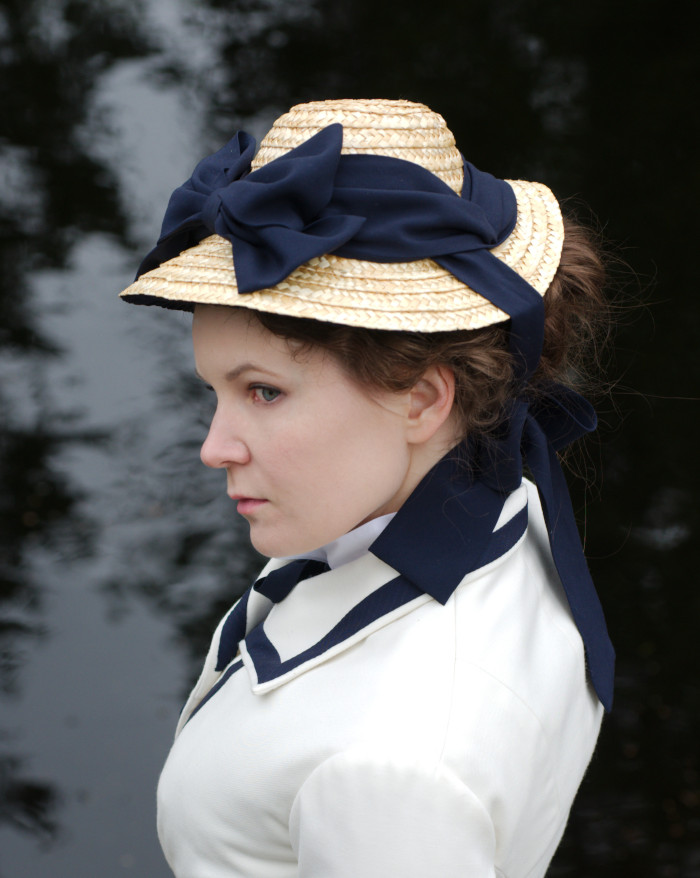
Hat for a walking dress,
2020
Naturally my new cream and navy walking dress
needed a new hat. The dress had a subtle maritime flair, so
a small boater might have been suitable, but after some
consideration I found I preferred the style with half high
crown and brim rising at the back typical to early 1880s. It
also covers much of the hair, which makes hairdressing for
daytime events less stressful and time-consuming.
Straw was an obvious material choice, ubiquitous for summertime hats on the period and also perfect for the color scheme of the outfit.
I had recently finally come across very narrow and delicate braided straw band, but of course I lacked the courage to actually use it. Instead I decided to make another hat of much coarser straw recycled from dirt cheap modern sunhats, for practice. I had a motley collection of shorter and longer leftover pieces from earlier projects, so I might just as well use them.
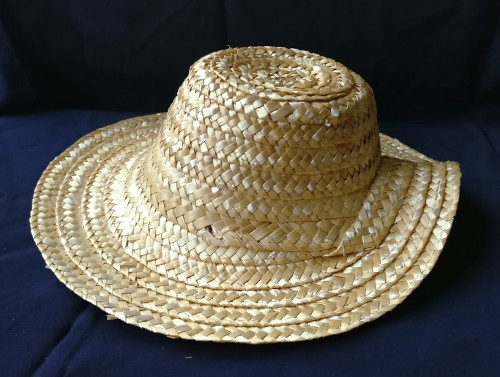
I have machine sewn straw in the past, but this time I assembled the whole hat base by hand. In my last hat project I had joined the overlapping straw bands with backstitch, mimicking the machine stitch with which the hat I had taken the straw from was originally sewn together. This time I tried a slanted stitch that dissapeared almost altogether in the braid. This practically invisible joining somehow makes the construction seem less crude and clunky despite the heavy straw braid.
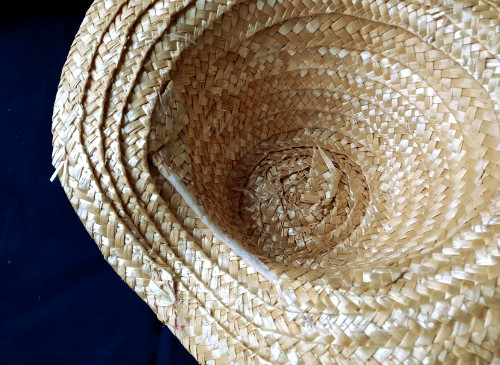
I began at the top of the crown. At the back of the crown I left the last few rounds of straw incomplete (a good way to use short pieces), and then sewed a piece of straw to form a curved arch at the base of the crown, turning its edges under the crown. Then I trimmed the straw ends under this piece and covered them with a bit of ribbon to keep them from breaking more.
Then I sewed rows of straw on the sides of the crown to form the brim. The first ones stop at the base of the crown so that the brim became wider at the front, and the outer ones going all the way round are overlapping a bit more at the back.
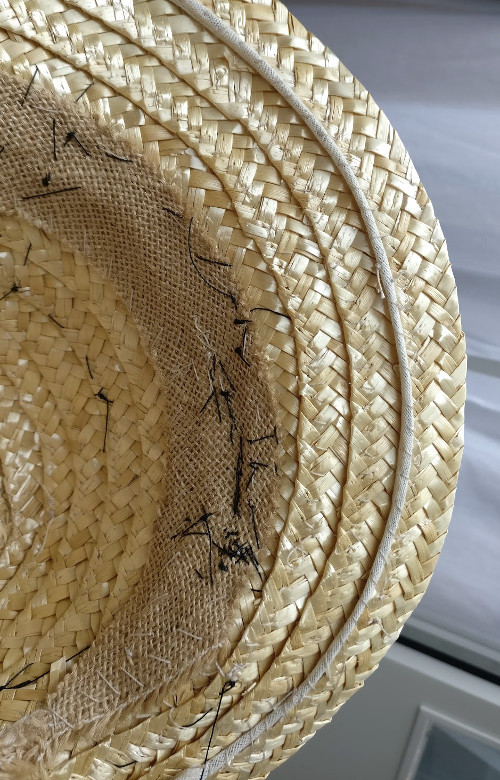
When I was happy with the hat shape and brim width I further reinforced the rather brittle and fragile straw structure with some additions. On the inner edge of the last straw band at the brim edge I sewed a tape casing with two rounds of metal wire inside. They support the brim edge, keep it in shape and protect it from being crushed which might break the straw.
On the joining of the crown and brim I basted a strip of bias cut canvas. Most of the hat trimming would be sewn there, and the canvas would keep the threads from digging into the straw and breaking it.
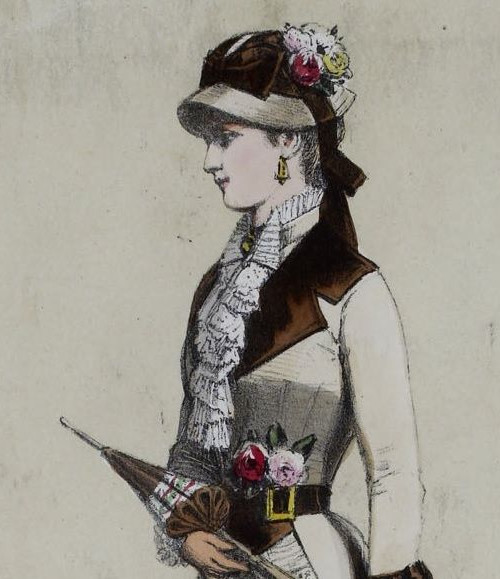
I wanted to keep the hat trimming rather simple, keeping in line with the clean, tailored look of the walking dress. When searching for inspiration this fashion illustration from La Mode Artistique (1880) especially appealed to me, and I could instantly picture the hat with dark navy blue ribbons.
Due to incredible luck I had in my stash a great charity shop find, probably viscose with dull sheen, great drape and a color matching the walking suit trimming perfectly. Dark navy and straw yellow also created a subdued, stylish color combo.
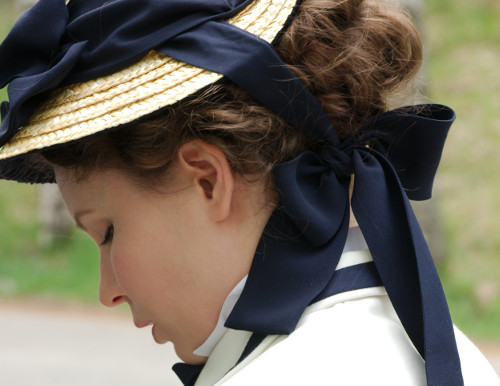
The the La Mode Artistique picture the hat had a bow tied at the back of the head rather than a loose one under the chin as seems to be more common in the period. I rather liked this look, it was less girly but still pretty, and when fastened under the bun the hat would also stay more securely on. Of course the hats of the period should be fastened with hairpins, but it wouldn't hurt to have extra support.
For the ties I cut a bias strip and sewed it into a 6cm wide doubled tape. I fastened the ends at the base of the crown. Then I sewed another bias tape, this time 10cm wide to circle the crown. I began fastening it at the back, folding it into pleats and fastening it at the back corners of the crown. Then I folded it to turn towards the front, spread it wider at the sides and gathered it to meet at the center front of the crown.
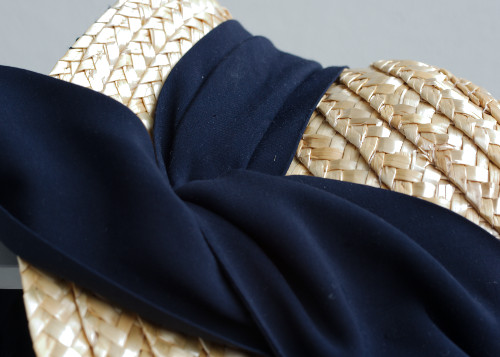
I sewed down the underside of the bias tape near the edges to keep in shape. Then I formed a large bow of the ends, cut off the extra length and closed the ends. I also fastened the bow loops and ends to the hat base from the underside to keep them from moving and getting wrinkled, which the viscose material was apt to do on its own.
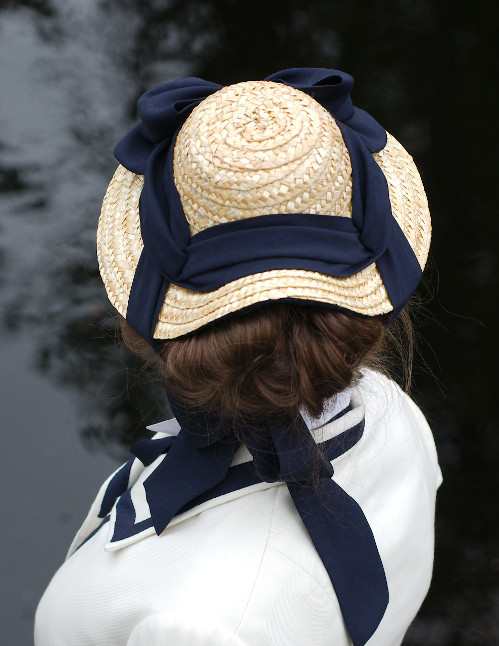
The hat needed a lining to cover all the mess on the underside of the brim, and I had gotten into my head that I wanted it to be a gathered one. After all I had plenty of material to spare, and the rather plainly trimmed hat could surely use a bit of decoration.
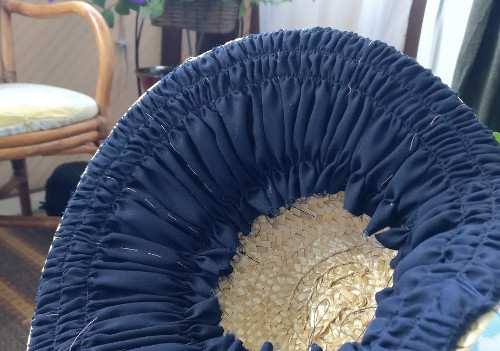
I cut the lining roughly two times as long as the brim edge. I basted threads at regular intervals to get the gathering even. Then I sewed the gathering threads by machine, first two lines closely together near the edge, and then further two spaced 1,5cm apart.
I pinned the lining on the brim edge at the marked lines and then began to pull the gathering threads in. It was really slow and frustrating work. Finally I got to fasten the gathered lining on the brim. I used slanted stitches and brought the needle between the straw layers, which did not however turn out as neat as I had hoped. The lining kept sliding inwards from the edge and the dark thread peeks out against the light straw.
Anyway, I battled on until I hag gotten round the brim for better or for worse. Then I began pulling in the other two gathering threads, which was again slow and tedious. Miraculously I did not break a gathering thread once, though. Having achieved this feat I marked the line where the lining should be sewn down on the crown base and sewed a more loosely spaced gathering thread along it by hand. Then I pinned the lining on the crown base, gathered it and sewed it down with whip stitch.
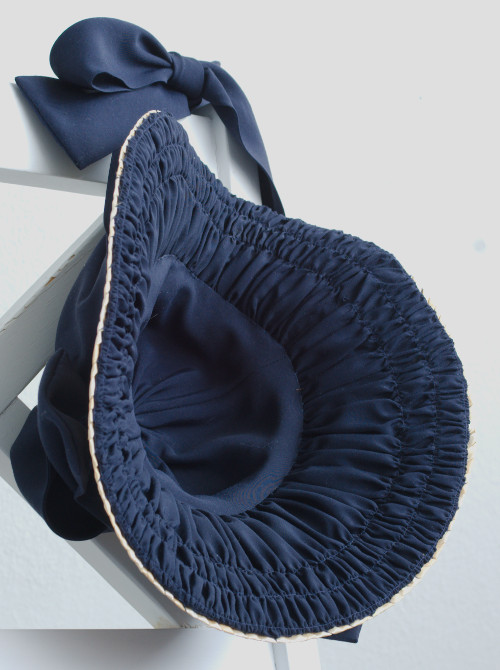
After trimming off the extra material I measured the inside circumference of the crown and cut a matching strip of material. I turned the lower edge under and sewed it to cover the gathered edge of the brim lining. Then I measured the desired height, gathered the turned edge and attached it with a few stitches at the top of the crown.
The gathered hat lining was much more work that I had expected, but it turned out a rather nice, though not altogether perfectly executed detail. Sadly, it shows hardly at all when the hat is worn. Oh, well, at least I got some practice.
I kept debating with myself almost until the end whether I should add some flowers after all, but finally decided against it. I'm happy I did, as I like the hat very much as it is, perhaps even more than the Tissot dress hat which had the flowers, the feathers and the bow. I did wonder at some point whether the wide dark fabric trim would make it look too somber, but in the end I think it forms a nice counterpart to the dark skirt of the dress. The bows lighten the mood a bit and bring a feminine touch on the sharp, clean and tailored look.
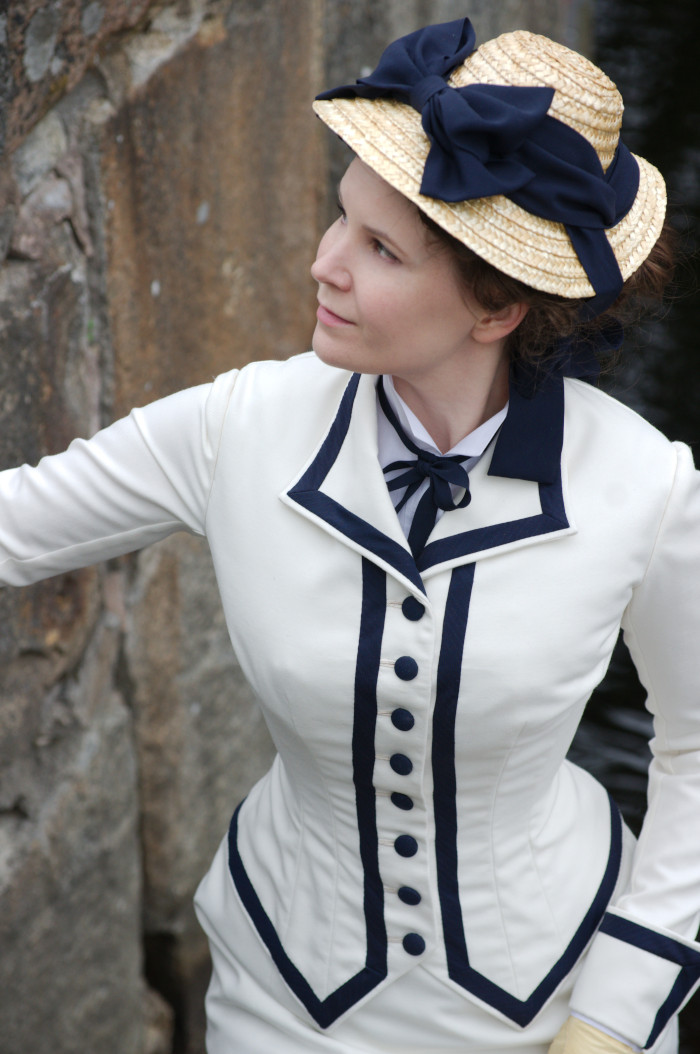
Straw was an obvious material choice, ubiquitous for summertime hats on the period and also perfect for the color scheme of the outfit.
I had recently finally come across very narrow and delicate braided straw band, but of course I lacked the courage to actually use it. Instead I decided to make another hat of much coarser straw recycled from dirt cheap modern sunhats, for practice. I had a motley collection of shorter and longer leftover pieces from earlier projects, so I might just as well use them.

The
straw base
I have machine sewn straw in the past, but this time I assembled the whole hat base by hand. In my last hat project I had joined the overlapping straw bands with backstitch, mimicking the machine stitch with which the hat I had taken the straw from was originally sewn together. This time I tried a slanted stitch that dissapeared almost altogether in the braid. This practically invisible joining somehow makes the construction seem less crude and clunky despite the heavy straw braid.

I began at the top of the crown. At the back of the crown I left the last few rounds of straw incomplete (a good way to use short pieces), and then sewed a piece of straw to form a curved arch at the base of the crown, turning its edges under the crown. Then I trimmed the straw ends under this piece and covered them with a bit of ribbon to keep them from breaking more.
Then I sewed rows of straw on the sides of the crown to form the brim. The first ones stop at the base of the crown so that the brim became wider at the front, and the outer ones going all the way round are overlapping a bit more at the back.

When I was happy with the hat shape and brim width I further reinforced the rather brittle and fragile straw structure with some additions. On the inner edge of the last straw band at the brim edge I sewed a tape casing with two rounds of metal wire inside. They support the brim edge, keep it in shape and protect it from being crushed which might break the straw.
On the joining of the crown and brim I basted a strip of bias cut canvas. Most of the hat trimming would be sewn there, and the canvas would keep the threads from digging into the straw and breaking it.

Trimming
I wanted to keep the hat trimming rather simple, keeping in line with the clean, tailored look of the walking dress. When searching for inspiration this fashion illustration from La Mode Artistique (1880) especially appealed to me, and I could instantly picture the hat with dark navy blue ribbons.
Due to incredible luck I had in my stash a great charity shop find, probably viscose with dull sheen, great drape and a color matching the walking suit trimming perfectly. Dark navy and straw yellow also created a subdued, stylish color combo.

The the La Mode Artistique picture the hat had a bow tied at the back of the head rather than a loose one under the chin as seems to be more common in the period. I rather liked this look, it was less girly but still pretty, and when fastened under the bun the hat would also stay more securely on. Of course the hats of the period should be fastened with hairpins, but it wouldn't hurt to have extra support.
For the ties I cut a bias strip and sewed it into a 6cm wide doubled tape. I fastened the ends at the base of the crown. Then I sewed another bias tape, this time 10cm wide to circle the crown. I began fastening it at the back, folding it into pleats and fastening it at the back corners of the crown. Then I folded it to turn towards the front, spread it wider at the sides and gathered it to meet at the center front of the crown.

I sewed down the underside of the bias tape near the edges to keep in shape. Then I formed a large bow of the ends, cut off the extra length and closed the ends. I also fastened the bow loops and ends to the hat base from the underside to keep them from moving and getting wrinkled, which the viscose material was apt to do on its own.

The hat needed a lining to cover all the mess on the underside of the brim, and I had gotten into my head that I wanted it to be a gathered one. After all I had plenty of material to spare, and the rather plainly trimmed hat could surely use a bit of decoration.

I cut the lining roughly two times as long as the brim edge. I basted threads at regular intervals to get the gathering even. Then I sewed the gathering threads by machine, first two lines closely together near the edge, and then further two spaced 1,5cm apart.
I pinned the lining on the brim edge at the marked lines and then began to pull the gathering threads in. It was really slow and frustrating work. Finally I got to fasten the gathered lining on the brim. I used slanted stitches and brought the needle between the straw layers, which did not however turn out as neat as I had hoped. The lining kept sliding inwards from the edge and the dark thread peeks out against the light straw.
Anyway, I battled on until I hag gotten round the brim for better or for worse. Then I began pulling in the other two gathering threads, which was again slow and tedious. Miraculously I did not break a gathering thread once, though. Having achieved this feat I marked the line where the lining should be sewn down on the crown base and sewed a more loosely spaced gathering thread along it by hand. Then I pinned the lining on the crown base, gathered it and sewed it down with whip stitch.

After trimming off the extra material I measured the inside circumference of the crown and cut a matching strip of material. I turned the lower edge under and sewed it to cover the gathered edge of the brim lining. Then I measured the desired height, gathered the turned edge and attached it with a few stitches at the top of the crown.
The gathered hat lining was much more work that I had expected, but it turned out a rather nice, though not altogether perfectly executed detail. Sadly, it shows hardly at all when the hat is worn. Oh, well, at least I got some practice.
I kept debating with myself almost until the end whether I should add some flowers after all, but finally decided against it. I'm happy I did, as I like the hat very much as it is, perhaps even more than the Tissot dress hat which had the flowers, the feathers and the bow. I did wonder at some point whether the wide dark fabric trim would make it look too somber, but in the end I think it forms a nice counterpart to the dark skirt of the dress. The bows lighten the mood a bit and bring a feminine touch on the sharp, clean and tailored look.
